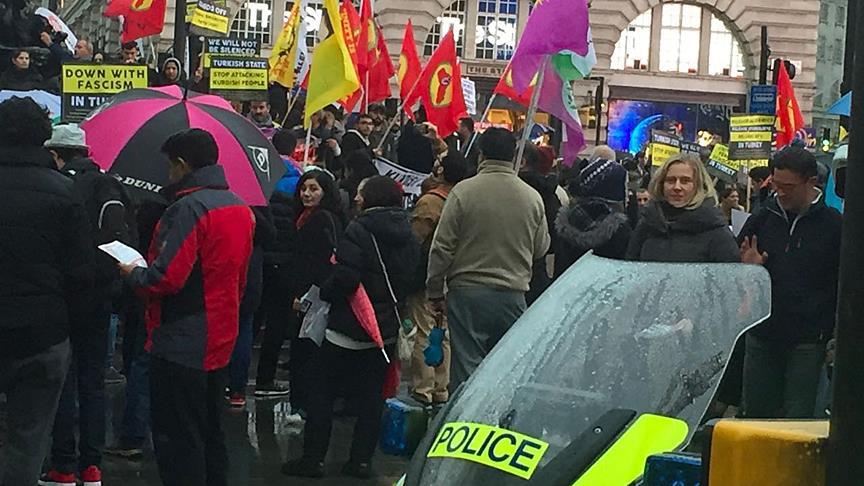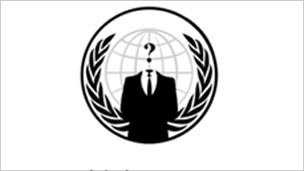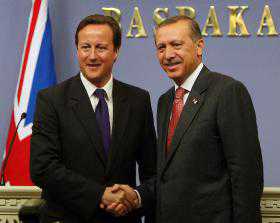Despite laws banning displays of support for ‘proscribed organizations’, London has seen a number of pro-PKK events

By Ahmet Gurhan Kartal
AA
LONDON
The activities of PKK sympathizers in London over the past two weeks is coming under more scrutiny, with questions being asked as to why backers of an illegal group are allowed to gather and mobilize publicly.
Groups of protestors carrying PKK flags, banners and posters — bearing the insignia of the illegal group or the likeness of its jailed leader Abdullah Ocalan — have been seen recently on the streets of the U.K. capital.
PKK supporters have been observed shouting anti-Turkish slogans and were able to mount propaganda without interference from the authorities, despite laws that regard some of their actions on these marches as criminal offences.
In recent rallies, two young Turkish citizens were attacked, a policeman was injured and some members of the general public were harassed.
The U.K. listed the PKK and various front groups as illegal organizations in March 2001. According to the Home Office, this means all their activities are banned, as is membership of or inviting support for such groups.
The PKK — listed as a terrorist organization by Turkey, the U.S. and EU — resumed its decades-old armed campaign in July last year. Since then, more than 300 civilians and nearly 800 security personnel in Turkey have been martyred. Around 8,000 PKK terrorists have been killed or apprehended.
However, London police have denied turning a blind eye to protests backing an illegal group.
Following a demonstration on Nov. 6 in the city’s Green Lanes area, the Metropolitan Police told Anadolu Agency it would not “allow a protest by a proscribed organization to take place in London”.
In an email, a spokesman added: “On this occasion the demonstrations were spontaneous. Where there is evidence that an individual is committing offences, officers will take action when and where appropriate.”
However, another procession held in central London on Nov. 12 was not spontaneous, having been planned, discussed and organized on a social media page for about a week beforehand.
In a separate email, police told Anadolu Agency the organizers of this procession engaged with the authorities beforehand and the route was altered to avoid Parliament Square.
Proscribed groups
Police on motorbikes opened the way for the group between Parliament Square and Piccadilly Circus via Regents Street.
A police van divided the road into two by using a white cordon until the demonstrators, some of who carried PKK emblems and flags, reached and encircled Piccadilly Circus’s famous Eros statue where they read out statements through a loudspeaker.
However, police described the Nov. 12 protest as a “march by a Kurdish Community Group”.
“This group is not a proscribed organization. The Met would not allow a protest by a proscribed organization to take place in London,” the statement added.
The U.K.’s Home Office says members or supporters of a proscribed organization are banned from showing and displaying articles of the group in public.
Official guidelines state it is a criminal offense to “arrange, manage or assist in arranging or managing a meeting in the knowledge that the meeting is to support or further the activities of a proscribed organization”.
It is also an offense to “wear clothing or carry or display articles in public in such a way or in such circumstances as arouse reasonable suspicion that an individual is a member or supporter of the proscribed organization”.
However, despite the fact that the processions openly displayed PKK flags and posters, police failed to identify them on Nov. 12 or during previous rallies.
Regarding the Nov. 12 demonstration, police said: “This was a peaceful protest and there were no reports of proscribed flags or organizations present… If offenses are committed by those taking part in a protest these offenses are reported and investigated.”
Former U.K. counter-terrorism detective David Videcette said police were unfamiliar with illegal PKK insignia due to a lack of training. He said policing the display of flags was “somewhat difficult in terms of the legality surrounding them here in the U.K.”
‘Lack of training’
He added: “Recently a man was seen wearing an Islamic State flag while standing outside our Parliament building. His son was waving an ISIS flag too.” ISIS is another acronym for Daesh.
“In order to prove that this was illegal, and that the man was a member of a proscribed organization, the police need more evidence than just the fact he is displaying a flag.
“It is true that he could have been arrested and an investigation started to establish this but often police officers are reluctant if there are no other obvious signs, there and then, of membership, other than the flag.”
Videcette told Anadolu Agency that “this is often a lack of training and understanding of the laws in the U.K. — arresting someone for terrorism is a specialist area of policing in the U.K., and few understand the laws surrounding it”.
He said he would “very much doubt that many police officers have any idea what the PKK flag even looks like. This makes dealing with it during any rally difficult.”
The U.K. government, however, is clear. Official Home Office rules state: “PKK/KADEK/KG is primarily a separatist movement that seeks an independent Kurdish state in southeast Turkey. The PKK changed its name to KADEK and then to Kongra Gele Kurdistan, although the PKK acronym is still used by parts of the movement.”
In October 2015, a woman of Kurdish origin was found guilty of PKK-related terrorism after she ran away from her family in an attempt to join the organization and sentenced to 21 months’ imprisonment.
Silhan Ozcelik became the first-ever person to be convicted in the U.K. of terror charges related to the PKK.
Videcette said: “I believe that the police service would and should act if the PKK flag is seen, just like they should have acted on the occasions that the ISIS flag has been seen at rallies.
“Sadly, it is often the case here that action is not taken at the time. In essence this is a training issue for the U.K. police service.”



